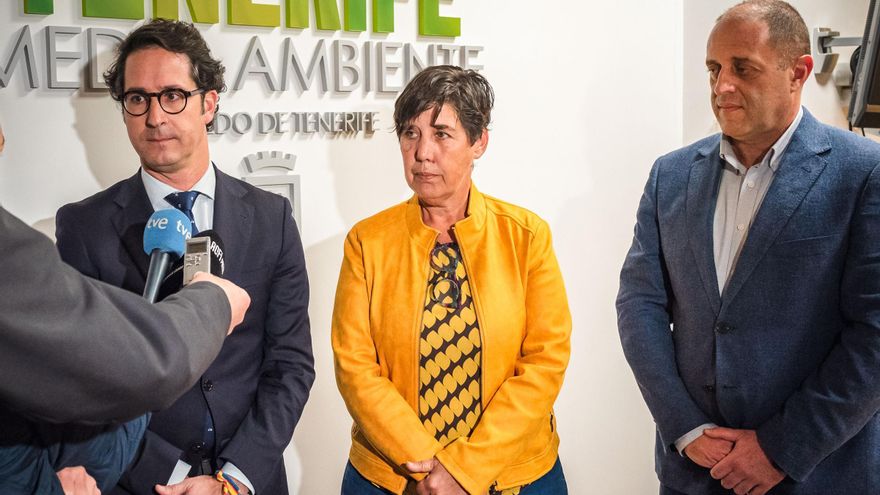
“Inaction”, “absolute paralysis” and “need to work in another way” in the recycling of waste and the path to the circular economy on the Island. These are the phrases that summarize the meeting held yesterday between the Natural Environment and Sustainability of the Tenerife Council and that of Ecological Transition and Fight against Climate Change of the Government of the Canary Islands. In essence, the parties conclude, “the need to act due to the four-year setback” in clear allusion to the socialist management in both administrations (2019-2023). This is how the island counselor summarizes it, Blanca Perez –accompanied by the Waste Director, Alejandro Molowny– and the general director of the regional Executive department, Ángel Pablo Montañés.
Forcefulness
Pérez is forceful: «In the policy of recycling management we have noticed an absolute paralysis regarding waste, both in the insular and regional administrations governed by the PSOE. The counselor argues that “an agreement was signed with the Government of Canary Islands “That didn’t come out and we had to rescue it after being stuck.” He anticipates that “we wrote the plan so that in a few months we can work in a different way.” He points out that “before there were people who sold a lot of smoke and didn’t believe in it.” There is agreement in “the commitment to a new strategy that we must urgently address.” Blanca Pérez believes that “we have to raise awareness among citizens and make an effort with our business community to invest in recycling.” She insists that “the administration must seek the objectives of the Comprehensive Waste Plan of the Canary Islands (Pircan), but that they are not just letters, but premises to advance in treatment and recycling in selective collection.”
Assessment
Ángel Montañés explains that “we have already started working on the Circular Economy Action Plan for the period 2024/2026, but it was very important to know what was executed in the previous two years.” He assures that the new Government has found thatand “there was no evaluation that would allow us to conclude where we are.” For this reason, he adds, “we want to know how we have to change the line of the circular economy.” He states that “they tell us that there was no coordination between the regional government and the administrations to move forward.” Montañés alludes to the “unconnected, independent actions and fruit of the will of the island administrators” of the previous regional government. He says: “That’s what we don’t want to happen again in the coming years.” He proposes an integrated process between all the Islands, the town councils and the business sector. The general director of Ecological Transition and Energy misses “a concrete plan, a roadmap with key actions to promote change and that is not a document of ideas without specificity or financial sheet.” One proposal is to advance in the treatment of organic matter without different speeds.
Coordination
The Cabildo of Tenerife and the Government of the Canary Islands will work in a coordinated manner to develop Tenerife’s new circular economy strategy, which will involve all social, environmental and economic agents. The path is to maximize recycling with an increase in selective collection of current and new waste fractions. Ángel Montañés points out that “the next step will focus on the analysis of the data collected, attaching a financial file (only in waste there is a budget of 30 million to invest in infrastructure) and defining responsibilities. For this reason, it will be necessary to reconnect with companies in the sector, city councils and citizens. Meetings have already been held with municipal technicians and today it is the turn of the business, social, environmental and university sectors in the II Tenerife + Sustainable Forum.
Composting
The philosophy involves plant management of organic matter, both for composting and biostabilization, in response to collection through the fifth container. Its about 40% of the waste that goes to the container. The intention is to treat and transform it as a use for the agricultural sector. Turn it into compost. The commitment, therefore, is to promote the circular economy supported by the necessary infrastructure both for correct management through reuse and recycling, mainly, and for industrial development. Blanca Pérez is “inefficient” that “we can select the separation of waste and not be able to give the material a new life or develop the recycling industry and thereby generate employment». He emphasizes that “we cannot allow more cell discharges (burials)” and much less “maintain the terrible data inherited from the previous government team” such as “only 3% of what enters the Arico Environmental Complex in the gray container.” is recycled. The worst historical figure for the CAT since 1985,” concludes the counselor.
Industry
The insular director of Waste, Alejandro Molowny, values the idea of developing recycling industries and increasing the levels of selective collection, but also that new fractions of that collection be incorporated in this exercise. Promoting the new recycling industry to be developed in Tenerife is equivalent, Molowny points out, to “getting that mass of waste to be able to valorize it here and give it added importance in our territory.” Another idea that he delves into: “We cannot forget about reuse, a factor that we discuss in different forums in the Cabildo to give a second life to the materials that we want to get rid of but that are still useful.”
“Tenerife has to return from the rear to occupy the position it should never have lost.” It is Molowny’s conclusion that Pérez and Montañés corroborate. They all propose the Island in the future as an “example of waste management and sustainability in RUP island territories.” To achieve this, the Cabildo of Tenerife concludes that “they work intensively and in coordination with administrations, economic, social and environmental sectors. “We cannot miss the opportunity.”















